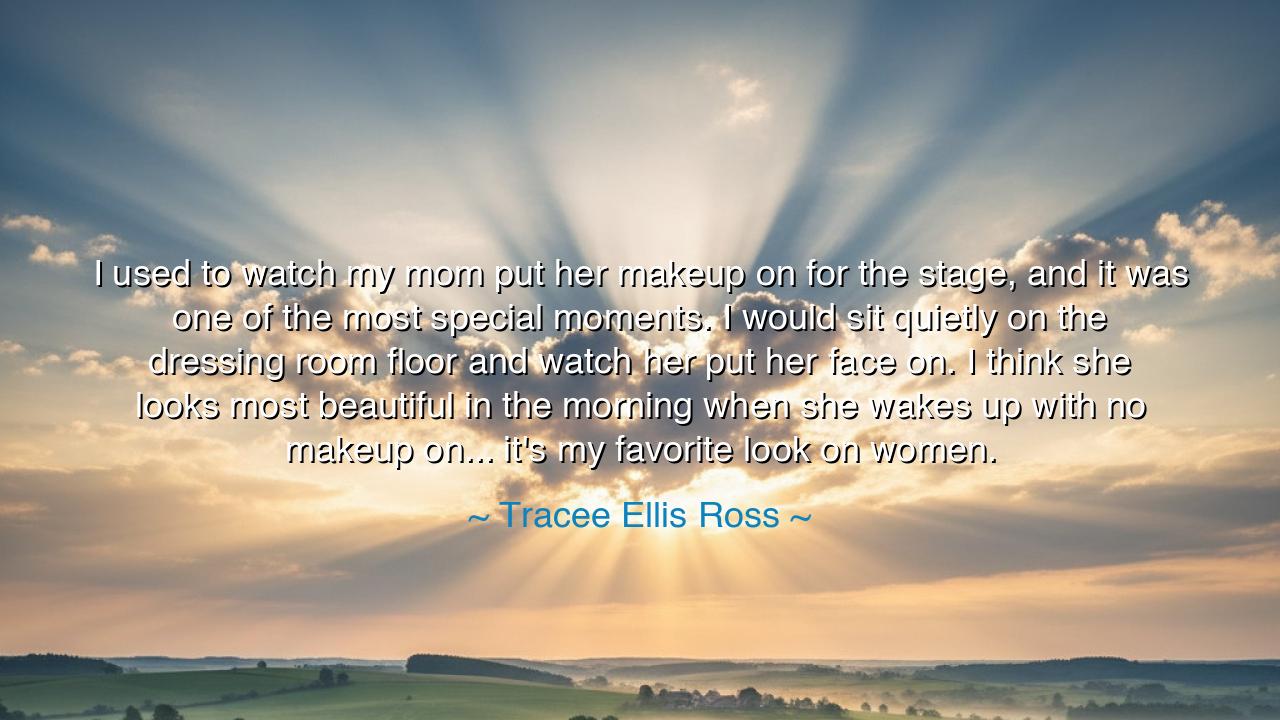
I used to watch my mom put her makeup on for the stage, and it
I used to watch my mom put her makeup on for the stage, and it was one of the most special moments. I would sit quietly on the dressing room floor and watch her put her face on. I think she looks most beautiful in the morning when she wakes up with no makeup on... it's my favorite look on women.






Tracee Ellis Ross once spoke with tenderness of memory and vision: “I used to watch my mom put her makeup on for the stage, and it was one of the most special moments. I would sit quietly on the dressing room floor and watch her put her face on. I think she looks most beautiful in the morning when she wakes up with no makeup on… it’s my favorite look on women.” In these words, there is both reverence for ritual and a profound truth about beauty, one that transcends paint, powder, and performance.
At the heart of this memory is the intimacy of childhood. The young Tracee, seated on the dressing room floor, gazing at her mother Diana Ross preparing for the stage, saw not only the transformation of an artist but the unveiling of mystery. The application of makeup was not mere vanity—it was the donning of armor, the preparation for the lights and the gaze of thousands. For the child, it was sacred theater, the hidden preparation behind the public radiance. It taught her that beauty can be art, that appearance can be ritual.
And yet, Tracee’s reflection carries a paradox. For while the stage demanded the face adorned, she declares her mother’s truest beauty to be found not beneath the spotlight, but in the first light of dawn—unguarded, unpainted, unadorned. In that quiet, vulnerable state, she saw a radiance deeper than any costume. It is a wisdom the ancients knew: that true beauty dwells not in decoration, but in authenticity, in the soul shining forth when it is most at ease.
History gives us parallels. Cleopatra, famed for her elaborate adornments, commanded the gaze of empires with her painted eyes and perfumes. Yet the Roman chroniclers noted that those who knew her intimately spoke less of her cosmetics and more of her charm, wit, and presence. The stage, whether in Alexandria or in Hollywood, may magnify one kind of beauty, but the morning face—simple, unmasked—is where the essence of personhood shines. Tracee Ellis Ross reminds us that both forms exist, but the greater lies in the unadorned.
Her words also speak to the larger struggle of women across generations: to be seen as whole persons, not merely as perfected images. The ritual of makeup is powerful, and can be chosen with pride. But the higher truth is this—no powder nor brush can rival the natural dignity of the human face, alive with truth. In admiring her mother’s unpainted features, Tracee honors all women who long to be cherished not for how they appear when perfected, but for who they are when most themselves.
The lesson is profound: seek the kind of beauty that cannot be washed away at night. Honor the rituals of preparation, yes, but do not mistake them for the essence. True beauty is not in performance, but in presence; not in the painted mask, but in the living soul. It is the radiance of being unafraid to be seen in one’s truth.
Practically, this calls us to cherish authenticity. Tell the people in your life that they are most beautiful when they are most themselves—in laughter, in rest, in vulnerability. Teach daughters and sons alike that adornment can be art, but it is not identity. And for yourself, stand unashamed in your own skin, remembering Tracee’s words: the truest beauty is often the simplest.
Thus, from the dressing room of her mother to the wisdom of her own voice, Tracee Ellis Ross gives us a teaching that transcends mirrors and lights. Beauty is art, but it is also truth. And in the morning face, unguarded and free, lies a glory that no stage can outshine.






AAdministratorAdministrator
Welcome, honored guests. Please leave a comment, we will respond soon